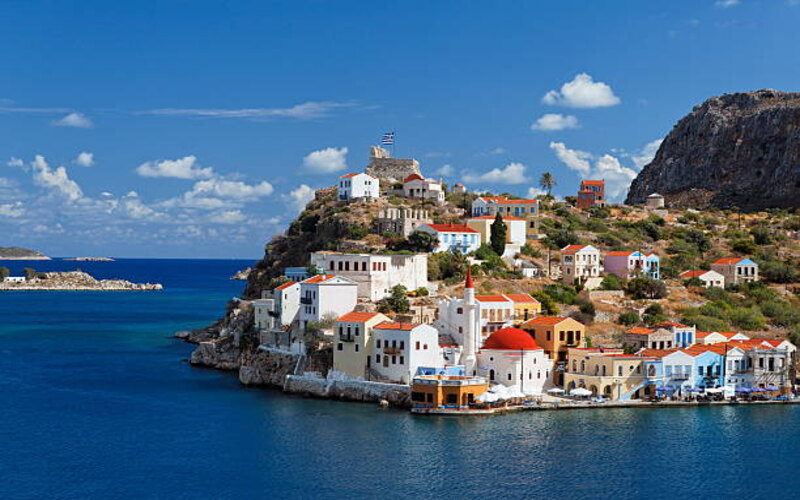Greece is a land steeped in mythology, where the tales of gods, heroes, and ancient civilizations come to life through its remarkable historic sites. From sacred temples to ancient theaters, these landmarks provide a window into the world of classical Greece, where mythology and history are intricately intertwined. Exploring these ancient sites allows visitors to walk in the footsteps of legendary figures like Zeus, Athena, and Apollo, immersing themselves in the stories that shaped Western culture.

Whether it’s the awe-inspiring Acropolis of Athens or the mystical sanctuary of Delphi, Greece’s ancient landmarks offer more than just architectural beauty. They serve as living reminders of a time when religion, politics, and art were deeply connected to mythology. Visiting these iconic places is not just a journey through history but a deeper exploration of the myths that continue to influence our modern world.
Here are some Exploring Greece’s Mythology: Visiting Famous Ancient Sites
1. Delphi: The Center of the World

Delphi was once considered the “navel of the world” in ancient Greek religion, making it one of the most significant spiritual and historical sites in Greece. Located on the slopes of Mount Parnassus, it was home to the famous Temple of Apollo, dedicated to the Greek god of the sun and prophecy. Built in the 5th century BC, the temple was the center of the Delphic Oracle, where the Pythia, a priestess, would deliver prophecies to those seeking guidance from Apollo. Delphi also features an ancient theater and a stadium where the Pythian Games, similar to the Olympic Games, honored Apollo. Visitors to Delphi can explore these ancient structures while soaking in the breathtaking views of the surrounding landscape. Delphi remains a powerful symbol of ancient Greek religion and mythology.
2. Ancient Agora of Athens: Heart of Public Life
The Ancient Agora of Athens was the focal point of political, social, and commercial activities in ancient times. Situated at the foot of the Acropolis, the Agora was a bustling marketplace where citizens would gather to debate politics, exchange goods, and discuss philosophy. It was the birthplace of democracy and served as a hub for intellectual and civic life. The site features several important structures, including the Temple of Hephaestus, one of the best-preserved ancient Greek temples. Visitors can walk through the ruins of the Agora and imagine the vibrant public life that once thrived here. This experience highlights Athens’ significance as a center of culture, politics, and learning.
3. Archaeological Site of Olympia: Birthplace of the Olympics
Olympia, located in the Peloponnese, is another key site for those exploring ancient Greece. It is the birthplace of the Olympic Games, which were first held in 776 BC in honor of Zeus, the king of the Greek gods, or possibly the legendary hero Hercules. The games were held every four years and became a symbol of unity among the Greek city-states. The site features the remains of the Temple of Zeus, which once housed one of the Seven Wonders of the Ancient World—a massive statue of Zeus. Today, visitors can explore the ruins of the ancient stadium, where original athletes competed, as well as the significant Temple of Hera. The spirit of the ancient Olympic Games still lives on through modern-day ceremonies held at Olympia.
4. Meteora: Monasteries in the Sky
While not directly linked to ancient mythology, Meteora is a place of spiritual and cultural significance. This UNESCO World Heritage Site features six monasteries perched atop towering rock formations, creating a dramatic and otherworldly landscape. Monks built the monasteries to seek solitude and a closer connection to the divine. Today, Meteora remains a place of pilgrimage and offers a unique blend of natural beauty and religious history. Visitors can hike through the area and explore the monasteries, each offering stunning views and insights into the Eastern Orthodox Church’s spiritual practices.
5. Ancient Corinth: A City of Commerce and Power

Ancient Corinth was one of the most powerful city-states in ancient Greece, with a history dating back to the Neolithic Period. It was strategically located between mainland Greece and the Peloponnese, making it a major center of trade and commerce. Corinth also played a prominent role in Greek mythology, particularly in the stories of Jason and Medea, as well as the hero Bellerophon. The city’s ruins include the Temple of Apollo, a testament to its wealth and power. Visitors can explore the remains of this once-thriving city, including the marketplace, theater, and fountains. This journey offers insight into the daily life and culture of ancient Corinth.
6. Epidaurus: Healing and Drama
Epidaurus is famous for its impressive ancient amphitheater, known for its extraordinary acoustics, and its association with the god Asclepius, the god of healing. In ancient times, Epidaurus was a center for healing, where pilgrims and travelers came to seek health and well-being. The sanctuary of Asclepius at Epidaurus was a site where patients received various treatments. These ranged from spiritual practices to early medical therapy. The amphitheater, seating up to 14,000 spectators, still hosts performances today, showcasing the legacy of Greek theater. Visitors can explore both the theater and sanctuary, connecting with the ancient world’s respect for health and the arts.
7. Acropolis: A Symbol of Ancient Greece
No visit to Greece is complete without a trip to the Acropolis, the iconic symbol of ancient Greek civilization. Perched above Athens, it houses famous structures like the Parthenon, a temple dedicated to Athena, the city’s patron goddess. The Acropolis was both a religious and political center in ancient times, reflecting the power and prestige of Athens. Today, the Acropolis stands as a testament to ancient Greece’s architectural and artistic achievements. Visitors from around the world come to marvel at its timeless beauty.
Conclusion
Exploring Greece’s ancient sites offers profound insights into the rich tapestry of mythology and history that defines the country. Each site, from the sacred grounds of Delphi to the majestic Acropolis, offers a unique glimpse into the beliefs and traditions of ancient Greece. These visits go beyond stunning ruins, allowing travelers to experience the enduring stories and legends that resonate through time.
For travelers looking to delve deeper into this captivating world, Greece Tour Packages and Greece Holiday Packages from Dubai provide the perfect opportunity to explore these iconic locations. These packages often include guided tours and unique experiences that enhance understanding of Greece’s mythology and history, ensuring a memorable journey filled with discovery. By immersing yourself in Greece’s ancient heritage, you’ll create lasting memories of a land where mythology comes to life.



